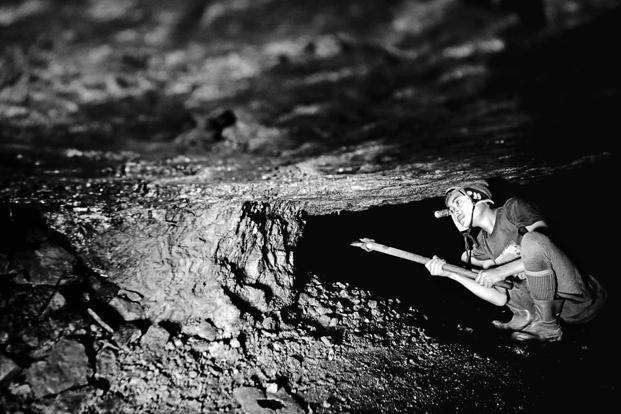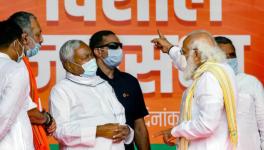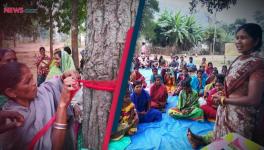‘Attempts to Save Meghalaya Miners Only a Face Saving Move’

The Central government on Friday rushed an additional National Disaster Response Force (NDRF) team to Meghalaya to assist the state in evacuating 15 miners who have been trapped inside an illegal coal mine for 16 days now. The district administration has temporarily suspended pumping of water from the coal pit since December 24. However, even though the NDRF rescuers team dived inside the main shaft of the coal pit they could not locate any of the miners. The Meghalaya government has said it is speeding up rescue efforts after divers at the site reported they detected foul smell in the cave, raising concerns it could be from decomposed bodies.
“The rescue operation is still on and our divers dived yesterday (December 27) to locate the trapped miners but could not locate any of them. There is nothing in the main shaft of the coal pit. We have used all the equipment available with us including SONAR (Sound Navigation and Ranging) to find out if any of the miners are still trapped in the main shaft," NDRF Assistant Commandant Santosh Kumar Singh told IANS.
It took a week for the district commissioner at East Jaintia Hills to send a letter to the Sangma government for acquiring powerful pumps. Nearly another week went by before Coal India got a word for help.
Also Read: Still No Trace of 13 Trapped Miners From Meghalaya
Many on the ground have called the attempts by the state government nothing more than a face-saving move. Speaking with NewsClick, activist Angela Rangad said, “The current attempts by the Meghalaya government are prime examples of face-saving. If the three local boys who had first reported the instance would not have been present, then the issue would have been hushed up like multiple other instances in the region. The mining operations in the area are random, untapped, and the government has crossed all limits of negligence in allowing the mines to come as close to the river bed.”
Highlighting the abysmal conditions of the workers, Rangad added, “The labours are promised high wages and are used almost as bonded labour. With the promise of Rs. 2,000 per day, the young minors hoping to make quick money, and feel trapped, not being able to go back to their native homes as they are not paid in time. They are also often threatened by powerful men running the mafia.” She went on to call this work as, “a form of modern slavery. There is also an angle of racism here, the workers largely bear Bangladeshi sounding names, which is why there is an aversion to saving them. This, at best, can be called utterly disgraceful and tragic.”
Previous Incidents
She stressed on the need to highlight the fact that this is not the first tragedy of its kind. In 2012, at least 15 persons were trapped inside a rat-hole mine in Nangalbibra of South Garo Hills. She said, “No one knows what happened to them. Since then, several mine collapses have occurred. Many of the casualties have gone unreported because of the clandestine nature of coal mining. According to activists, in case of accidents involving migrant miners, the people running the operation simply hush things up.”
Illegal mining in the state has led to many incidents resulting in the death of the labourers. In February 2014, four miners were killed when the walls of an illegal mine in the Garo hills had collapsed. In December 2013, five miners died due to the snapping of the cable of a basket carrying them.
Having about 650 million tonnes of coal reserves, this multi-crore business with links across several states in the country, and in Bangladesh, is allegedly funded by high-profile politicians and businessmen.
Also Read: Meghalaya RTI Activist Attacked for Looking into Illegal Coal Mining, Condition Critical
Alleging that coal mining has resulted in pollution of the Kopili River, the Assam-based All Dimasa Students’ Union from the Dima Hasao District had filed a petition against rat-hole mining, following which the National Green Tribunal had clamped a ban on the activity on April 17, 2014. However, after protests by the mining lobby, the Tribunal had allowed the transport of the already-mined coal.
Despite the four-year-old ban on rat-hole mining in the state by the NGT, the illegal activity has been functional in full view, owing to the loophole that allowed the transportation of already mined coal. The state government had further challenged the NGT ban in the Supreme Court in November this year, leading to an extension of the transportation deadline till January 31, 2019.
The crisis has now taken a political turn with the main opposition, Congress, heavily criticising Chief Minister Conrad Sangma for what it claims is his "sloppy attitude" in handling the crisis.
Get the latest reports & analysis with people's perspective on Protests, movements & deep analytical videos, discussions of the current affairs in your Telegram app. Subscribe to NewsClick's Telegram channel & get Real-Time updates on stories, as they get published on our website.























